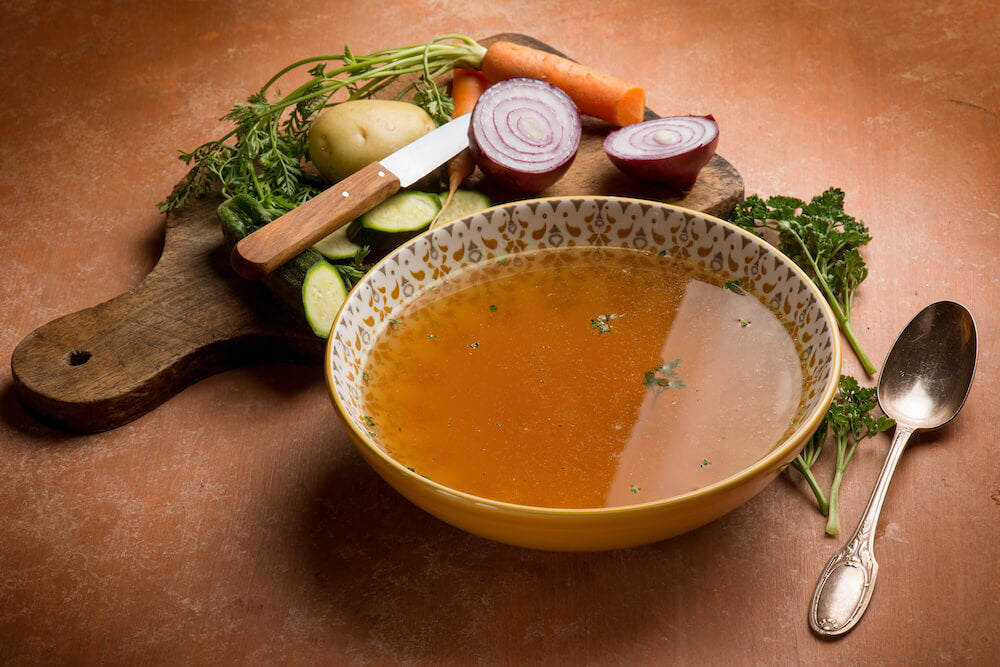The Ultimate Guide to Making Bone Broth: Health Benefits, Recipes, and Tips
Bone broth has been a culinary and nutritional staple for centuries. This humble yet versatile concoction is beloved for its depth of flavour, comforting warmth, and exceptional health benefits. In recent years, it has enjoyed a resurgence in popularity, and rightly so. Whether you're sipping it as a nourishing drink or incorporating it into recipes, bone broth is a powerhouse addition to your diet.
In this blog post, we'll explore everything you need to know about bone broth—from its origins and health benefits to tips for making your own and delicious ways to use it. Get ready to transform your kitchen and your health with this ancient elixir.
What Is Bone Broth?
Bone broth is a savoury liquid made by simmering animal bones and connective tissues with water, vegetables, herbs, and spices. While it shares similarities with stock and soup broth, it stands apart due to its prolonged cooking time, which extracts more nutrients and flavour from the bones.
This nutrient-rich liquid is celebrated not only for its culinary uses but also for its potential health benefits, which are supported by both traditional wisdom and modern science.
Health Benefits of Bone Broth
1. Rich Source of Collagen
Collagen is the most abundant protein in the human body, and bone broth is an excellent natural source. When simmered for long periods, the collagen in bones and connective tissues breaks down into gelatin, which provides the building blocks your body needs to maintain healthy skin, hair, nails, and joints.
2. Gut Health and Digestion
Bone broth contains amino acids like glutamine, which help repair the lining of the gut. If you suffer from digestive issues such as leaky gut syndrome, regular consumption of bone broth may support gut health and improve digestion.
3. Joint and Bone Support
The slow cooking process releases compounds like glucosamine and chondroitin from the bones. These are commonly found in joint supplements and may help reduce inflammation and improve joint health. The calcium, magnesium, and phosphorus in bone broth also contribute to maintaining strong bones.
4. Immune System Booster
Bone broth is often touted as a remedy for colds and flu. Its rich mineral profile and the presence of compounds like glycine and proline may help strengthen the immune system, making it easier to fight off illnesses.
5. Skin Health
The collagen and gelatin in bone broth may improve skin elasticity and hydration, reducing the appearance of wrinkles and supporting overall skin health.
6. Weight Management
Low in calories but high in protein, bone broth can help you feel full and satisfied, making it a great addition to a weight-loss plan. Use it as a snack or base for soups to curb hunger without consuming excessive calories.
7. Improved Sleep
Glycine, an amino acid abundant in bone broth, has been shown to promote relaxation and improve sleep quality. A warm mug of bone broth before bed might be just what you need for a restful night.
How to Make Bone Broth at Home
Making bone broth at home is a straightforward process, but it does require patience. The reward is a deeply flavoured, nutrient-packed broth that can be customised to your liking.
Basic Ingredients
- Bones: You can use beef, chicken, pork, lamb, or even fish bones. Look for marrow bones, knuckles, feet, and wings for the richest broth.
- Vegetables: Onions, carrots, and celery are classic additions, but you can also include leeks, garlic, or other vegetables.
- Apple Cider Vinegar: This helps extract minerals from the bones during cooking.
- Water: Use enough to fully cover the bones and vegetables.
- Herbs and Spices: Bay leaves, peppercorns, thyme, and parsley are great options. Avoid adding salt at the beginning, as the broth will reduce and intensify in flavour.
Equipment
- Large stockpot, slow cooker, pressure cooker or wok with lid (Pep Wok is available here).
- Fine mesh strainer or cheesecloth
Step-by-Step Instructions
- Prepare the Bones
- If using raw bones, roast them at 200°C for about 30 minutes to enhance their flavour.
- For leftover bones from cooked meat, you can skip this step.
- Combine Ingredients
- Place the bones, vegetables, apple cider vinegar, and herbs in your chosen cooking vessel.
- Add enough water to cover the ingredients.
- Simmer
- Bring the mixture to a boil, then reduce to a gentle simmer.
- Skim off any foam or impurities that rise to the surface in the first hour.
- Cook
- For chicken or fish bones: Simmer for 6–12 hours.
- For beef or pork bones: Simmer for 12–24 hours.
- In a pressure cooker: Cook for 2–4 hours on high pressure.
- Strain and Store
- Strain the broth through a fine mesh sieve or cheesecloth.
- Let it cool, then transfer to jars or containers.
- Store in the fridge for up to 5 days or freeze for up to 6 months.
Tips for Perfect Bone Broth
- Use Quality Bones: Opt for organic, pasture-raised, or grass-fed bones for the best flavour and nutrient profile.
- Add Aromatics Later: For a more complex flavour, add fresh herbs like parsley or dill in the last hour of cooking.
- Don’t Skimp on Time: The longer you cook the broth, the more nutrients and gelatin you’ll extract.
- Chill to Remove Fat: After cooling, the fat will rise to the top and solidify, making it easy to remove if you prefer a leaner broth.
Creative Ways to Use Bone Broth
Bone broth is incredibly versatile and can be used in a variety of dishes. Here are some ideas to inspire you:
1. As a Hot Beverage
Sip bone broth on its own for a comforting, nutrient-rich drink. Add a pinch of sea salt, turmeric, or a dash of lemon juice for extra flavour.
2. Soups and Stews
Bone broth is the perfect base for hearty soups and stews. Use it in classics like chicken soup, beef stew, or minestrone.
3. Sauces and Gravies
Enhance the depth of your sauces and gravies by using bone broth instead of water or stock.
4. Cooking Grains
Cook rice, quinoa, or barley in bone broth for added flavour and nutrients.
5. Braising Liquid
Use bone broth to braise meats or vegetables, infusing them with its rich taste.
6. Smoothies
For a savoury twist, incorporate chilled bone broth into smoothies alongside vegetables and herbs.
Bone Broth Recipes to Try
1. Classic Beef Bone Broth
Ingredients:
- 2 kg beef bones (marrow, knuckles, or oxtail)
- 2 carrots, roughly chopped
- 2 celery stalks, roughly chopped
- 1 onion, quartered
- 2 tbsp apple cider vinegar
- 2 bay leaves
- 10 peppercorns
- Water to cover
Instructions:
- Roast the bones at 200°C for 30 minutes.
- Combine all ingredients in a large pot and simmer for 12–24 hours.
- Strain and store.
2. Chicken Bone Broth
Ingredients:
- 1 whole chicken carcass or 2 kg chicken wings and feet
- 2 carrots, roughly chopped
- 1 onion, quartered
- 3 garlic cloves
- 2 tbsp apple cider vinegar
- 1 tsp dried thyme
- Water to cover
Instructions:
- Add all ingredients to a slow cooker.
- Simmer on low for 12 hours.
- Strain and store.
3. Fish Bone Broth
Ingredients:
- 1 kg fish bones (heads and frames)
- 1 onion, roughly chopped
- 1 leek, sliced
- 1 fennel bulb, sliced
- 2 tbsp white wine
- 1 bay leaf
- Water to cover
Instructions:
- Sauté the vegetables and fish bones in a large pot.
- Add water, white wine, and bay leaf. Simmer for 2–4 hours.
- Strain and store.
Bone Broth FAQs
1. Can I reuse bones?
Yes! Many bones can be reused for a second batch. The flavour and gelatin content will diminish, but it's a great way to maximise resources.
2. Why does my broth gel?
Gelling is a sign of a successful broth with high gelatin content. It will liquefy when heated.
3. Can I make broth without a long cooking time?
While longer cooking times extract more nutrients, a pressure cooker can reduce the time significantly.
4. How can I store broth?
Freeze broth in ice cube trays for convenient, portion-sized servings.
Bone broth is a time-honoured tradition that has earned its place in modern kitchens for its incredible versatility and health benefits. Whether you're sipping it straight or using it as the foundation for your favourite recipes, bone broth is a simple yet powerful way to nourish your body and elevate your cooking.
By learning to make bone broth at home, you'll not only save money but also ensure that every batch is tailored to your taste and dietary needs. Start experimenting today, and discover why this age-old remedy is still a staple in kitchens around the world.

